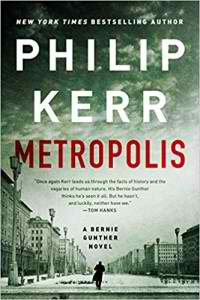Metropolis by Philip Kerr
 Monday, April 15, 2019 at 7:51AM
Monday, April 15, 2019 at 7:51AM 
Published by G.P. Putnam's Sons on April 9, 2019
Philip Kerr died in March 2018. He is survived by a memorable body of work. About half of Kerr’s novels record the career of Bernie Gunther, from Berlin police detective to private investigator to investigator for a Nazi intelligence agency to POW to private detective again to fugitive. Gunther is one of the most interesting and complex characters in crime fiction.
Metropolis is Kerr’s last Bernie Gunther novel, published posthumously. Other than the first three, which were written as a trilogy, they can be read in any order, as they jump around the stages of Gunther’s life, following no particular chronology.
Metropolis tells the story of Bernie Gunther’s promotion from Vice to the Murder Commission in 1928. His first assignment involves the murders and scalping of four prostitutes near Berlin’s Silesian Station. Unemployment is rampant, forcing more women onto the streets, sparking waves of violence, and leading to clashes between communists and Nazis. Fritz Lang wants to make a film about mass murderers and his wife, who is writing the script, meets with Bernie to get the juicy details about the scalpings. The novel shares the title of Lang’s best-known film which, like the book, contrasts a beautiful and cultured city with the injustice suffered by its workers.
A second serial killer appears before the Murder Commission can get a handle on the scalper. This one is shooting disabled war veterans, apparently practicing a form of eugenics to make a point about patriotism. Since the deaths of veterans make bad press, the police are told to drop the first investigation (the victims are just prostitutes, after all) and to focus on the new killer. Bernie goes undercover, a new concept in police work, as he plays the role of a legless veteran on a cart, serving as bait for the killer. Like most undercover operations, the effort does not go as planned, but it does lead Gunther’s investigation in new directions.
Metropolis is a classic detective novel with the kind of intricate plot for which Kerr is known. The reader and Gunther consider an array of clues and possible suspects as they try to identify the killer(s). The resolution is satisfying and surprising.
The time frame allows Kerr to consider the limits of democracy. “What use is it when it can’t deliver a viable government?” Gunther asks. Another character opines: “There’s only so much democracy that one country can take before people get tired of the idea.” Unfortunately, as the rise of Hitler demonstrated, authoritarians use democracy only to undermine it. They appeal to weak minds and get themselves elected by demonizing scapegoats. Gunther is an intriguing character because he managed to survive without losing his humanity in a country that repeatedly chose hatred and ethnic purity over tolerance and empathy.
Vigilantism is another theme. Bernie finds himself arguing with vigilantes who do not believe killers deserve a fair trial. With as much crime and injustice as Gunther has seen, he might be tempted to agree, but he understands that civilization depends on applying the same rules of fairness to the best and the worst equally. The concepts of fairness and equality, of course, will soon be lost in Gunther’s Germany. Gunther is, in the words of one character, “guarding an empty safe,” yet the safe will never be replenished if people like Gunther do not stand up for principles.
The historical settings always make Bernie Gunther novels fascinating, but the novels succeed so admirably because Gunther is such a fascinating character. Dark, snide, jaded, but as honest as circumstances allow him to be, Gunther is a perfect noir character. Fans of crime fiction will miss him.
RECOMMENDED



